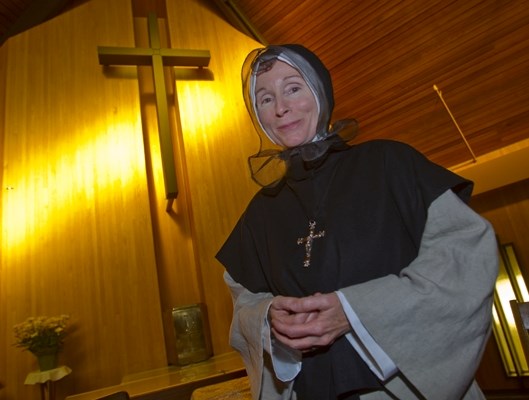St. Marguerite d’Youville lived an extraordinary life, one filled with great pain and great achievement. However, it was the nun’s welcoming compassion to all displaced persons that set her heads above others of her time.
The Montreal-based leader founded the Sisters of Charity (Grey Nuns) in 1737 and almost a century later Father Lacombe invited the order to the St. Albert mission. It was the province’s first hospital and by November of 1863, the nuns nursed their first patient.
For her charitable works, the Roman Catholic Church canonized Youville, the first Canadian to attain sainthood.
Youville Home together with Covenant Health commissioned St. Albert actor Maureen Rooney to write a play celebrating the 150th anniversary of the first hospital.
Interview History With St. Marguerite d’Youville receives its public premiere this coming Sunday at St. Albert Community Hall.
During an interview with the Gazette, Rooney was in awe of this early Canadian woman who was faced with death at every stage of life. She lost her father at age seven and was married to a whiskey trader who died leaving her in debt at 28. During her marriage she gave birth to six children. In this pre-antibiotic era, four died at a young age.
“There are many who give up, who succumb to the tough times. And then there are those who seem to have the ability to go through some tough times and allow themselves to be better. She was able to be compassionate and make the world a better place.”
“This was a woman who went through hell. I can’t imagine losing one child, let alone four and have an entire town look down on you because of who you are married to.”
“And to be a woman whose faith is not just a story. It’s the actual thing that’s in her that allows her to take in the darkness and turn on the light for those around her.”
d’Youville’s model for courage in tough times was her mother. After d’Youville’s father died, her well-heeled family was left destitute. d’Youville’s mother “pulled up her bootstraps and used her business skills to survive doing sewing, needlepoint and weaving,” Rooney explained.
d’Youville adopted her mother’s attitude and opened a business after her husband died. She paid off his debts, put her two sons through school and started taking in the poor who crossed her path.
Together with two friends who dedicated themselves to serving the poor, they founded the Sisters of Charity in Montreal. People mocked them with the moniker “Grey Nuns.”
As Rooney explains it, they were dubbed the “grises” nuns, a reference to drunkenness. It is also a play on the word “gris” which translates into English as grey.
d’Youville and her followers moved into an abandoned, decaying Montreal hospital, and took over the administration as a refuge for unwed mothers, prostitutes, the elderly, the sick, the poor, wounded soldiers and people with epilepsy.
The hospital prospered and its success even reached King Louis’ ears. Through it all she survived personal harassment, political interference, fire and hunger.
“She discovered more than one body of children slain and left frozen in ice. She decided to take in orphans, children who otherwise would have been sold, abandoned, abused or murdered.”
But in making sure that children were fed, often the nuns suffered from malnutrition.
The little nun from Quebec left a legacy of facilities across the world. More importantly, she lived a philosophy of making the world a more civilized place.
“She left a challenge to all of us to look after one another, to see Christ in those in need and to reach out accordingly. She put action into her faith and that’s the legacy.”
Preview
Interview History with Marguerite d’Youville<br />Sunday, Nov 16 at 7 p.m.<br />St. Albert Community Hall<br />17 Perron Street<br />Free will offering




